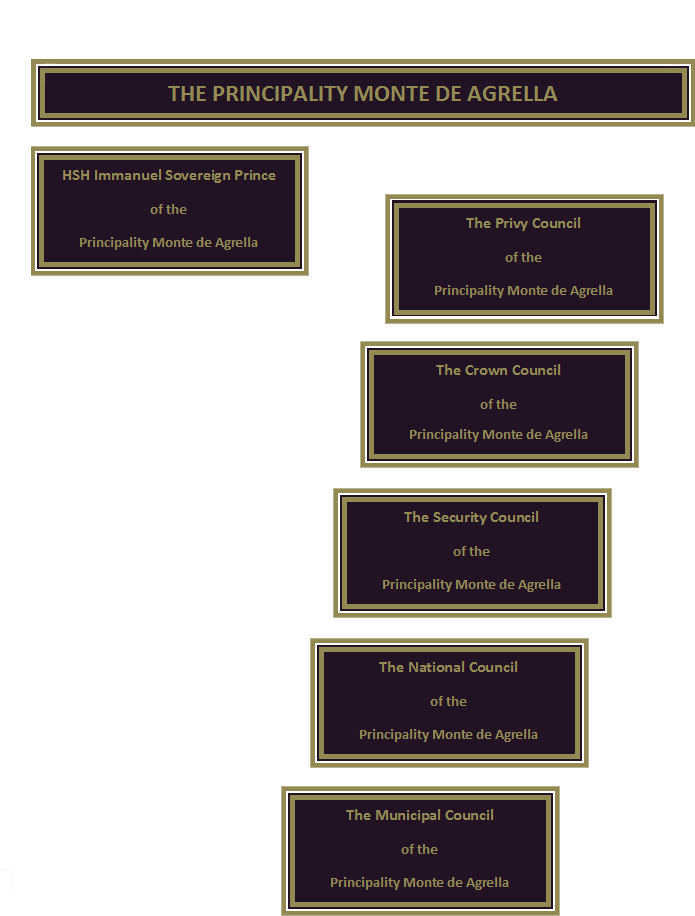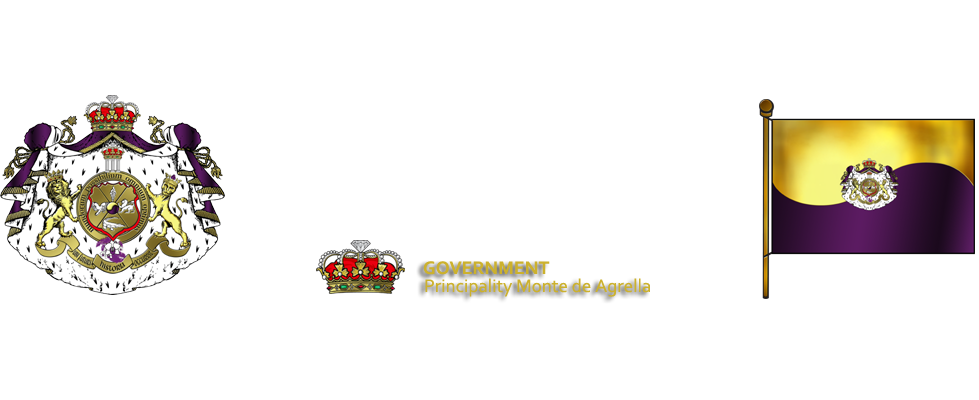Organizational Chart

ORGANIZATIONAL STRUCTURE OF THE GOVERNMENT
1. H.S.H. Sovereign Prince of Principality Monte de Agrella
With Executive Privilege, as the Prince is Head of Government as well as Head of State, there is no requirement to have a Prime Minister. The Prince is legally required by Constitution (and morally compelled by good conscience) to listen and heed the opinions and arguments of his appointed Crown Council Cabinet before any exercise of his ultimate Executive Authority. He is free to appoint and dismiss Ministers, shuffle and rearrange posts and portfolios, as he deems appropriate. Day-to-day Executive Authority is normally delegated to his Ministers for their underlying portfolios, notwithstanding, the Prince is Commander-in-Chief of the Principality Security Force.
The Prince’s duties apply to the several Government Councils. The legislative and administrative powers are exercised jointly by the Prince and his Crown Council Cabinet of Ministers, advised by the Privy and National Councils.
For the National Council, the Prince announces elections and convenes its first meeting. For the Principality Security Council, he may request meetings of this Council and Chair them during a State of Emergency. Regarding the Privy Council, the Prince promulgates laws approved by the Privy Council and appoints judges to the Constitutional Court upon the proposal of the Privy Council. Also after consulting the Privy Council, the Prince can exercise the right to pardon and amnesty as well as the right of naturalization and restoration of nationality.
Representing stability and continuity, highlighting achievement, and emphasizing the importance of voluntary service in the sectors providing encouragement demonstrates leadership by example.
Often welcoming Dignitaries to the Principality, and attending State dinners during State visits, as well as representing the Principality overseas at state and ceremonial occasions.
2. The Privy Council of Principality Monte de Agrella
The Privy Council consists of a minimum of three (3) and a maximum of seven (7) members, appointed by the Prince of Principality Monte de Agrella to serve for a period of six (6) years.
The President of the Council is directly selected by the Prince. The Privy Council meets at least twice a year further to the Prince’s summons. In addition, the Prince of Principality Monte de Agrella can call a meeting anytime he deems it necessary, either on his initiative, or further to the suggestion of the Privy Council’s President. The Privy Council’s organization and operations are prescribed by Sovereign Ordinance.
The Privy Council of Principality Monte de Agrella: proposes, debates, drafts, and in consultation with the Prince, passes legislation and ordinances; is consulted by the Prince on issues regarding Principality Monte de Agrella’s higher interests. Also it must be consulted on subjects relating to international treaties, requests to dissolve the National Council, naturalization and restoration of nationality, pardons, and amnesties.
3. The Crown Council of Principality Monte de Agrella
The Crown Council is The Executive Committee of the Government. The Crown Council is the Cabinet of the Prince, consisting of the Secretary of State, and the 13 Ministers who execute their portfolios of responsibilities and duties. They implement the law and order on the operational, and administrative side of the government, and enforce the Executive aspect of the Government.
The Ministerial Departments include:
Department of the Secretary of State
1. Department of Ministry of Internal Affairs: Interior;
2. Department of Ministry of Foreign Affairs and International Relations: Exterior;
3. Department of Ministry of Treasury and Finance;
4. Department of Ministry of Justice;
5. Department of Ministry of Innovation Science and Technology, Culture and Education;
6. Department of Ministry of Public Affairs, Smart Architecture and Infrastructure, Urban Development and Transportaiton;
7. Department of Ministry of Media, Sport, and Recreation {Tourism and Entertainment};
8. Department of Ministry of Defense, Intelligence, Security, and Logistics;
9. Department of Ministry of Information, Technology, Media, and Communication;
10. Department of Ministry of Ministry of Health and Wellness {Life Sciences and Social Affairs};
11. Department of Ministry of Economic Development, E-commerce, Trade, and Industry
12. Department of Ministry of Peace
13. Department of Ministry of Ministry of Environemental Affairs, Climate Change and Sustainable Ecology, Agriculture, Agri-Food, Forestry and Territory;
The Government is accountable to the Prince of Principality Monte de Agrella regarding its work.
The Ministers are jointly accountable for the decisions made by the Government, and individually accountable for decisions made under their portfolio and in their fields of duties and responsibility.
4. The Security Council of Principality Monte de Agrella
The Security Council of Principality Monte de Agrella, in cooperation with the Prince, the Principality, and the Government, develops the security strategy for Principality Monte de Agrella. The Security Council of Principality Monte de Agrella shall also have an advisory role on all matters relating to security in Principality Monte de Agrella.
The Security Council of Principality Monte de Agrella shall be chaired by the Minister of Defense with the support of the Government, except during a State of Emergency as provided by the Constitution.
The Prince of Principality Monte de Agrella may require meetings of the Security Council of the Principality, and the Council is obliged to closely coordinate its work with the Prince. The Security Council of Principality Monte de Agrella shall closely cooperate with international authorities.
Members of the Security Council of Principality Monte de Agrella shall be appointed and dismissed in a manner provided for by law.
5. The National Council of Principality Monte de Agrella
The National Council (or “Assembly”) is the public-advisory legislative institution of Principality Monte de Agrella, directly elected by the people.
The Assembly: proposes laws, resolutions and other general acts; gives voice and expresses public opinion on the work of the Government and other public institutions; debates and advises in regard to general interest issues as set forth by law.
The inaugural National Council of Principality Monte de Agrella consists of ten (10) deputies, to be elected for a mandate of four (4) years. The Mandate of the National Council deputies may be extended only in a State of Emergency for emergency defense measures, or for danger to the Constitutional order, or to public safety of the Principality, for as long as the State of Emergency continues.
The Prince of the Principality shall convene the constitutive session of the National Council, and if the Prince is unable to convene the initial session, the Assembly shall be convened without the Prince’s participation.
The National Council of Principality Monte de Agrella elects the Speaker of the Assembly and a Deputy Speaker from among its deputies. The Speaker of the Assembly represents the National Council; sets the agenda, convenes and Chairs the sessions; signs acts adopted by the Assembly and exercises other functions in accordance with the Constitution and the Rules of Procedure of the Assembly.
6. The Municipal Council of Principality Monte de Agrella
The Municipal/Commune Council represents physically the people, by the people and for the people, the mouthpiece for and on behalf of the people that help bring the country together. They represent the people on the ground, as they are the voice of the people in the form of advocacy.
The Municipal/Commune Council is a Committee in the Principality who are elected by the people. They address and take care of all municipal issues, Registry of births, deaths, and Population statistics of the country. Also areas including; motorization, license plates, registry of land, titles and deeds, environmental goods and territories, Registry of asset registers, trusts, foundations, associations, holdings, and special purpose vehicles, Registry of web-domains and television, telecommunications, etc…
The Municipal/Commune Council runs on its own with the Police as the common ground overseeing the people. The Mayor addresses and takes care of everything below the level of the Security Council down to the Commune Council, linking to Commune Council in tandem with the Police Commissioner.
